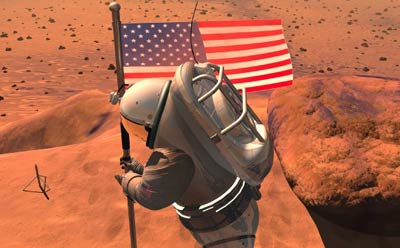A mandate for exploration?by Taylor Dinerman
|
| The Vision for Space Exploration is as profoundly American in spirit as the Apollo project was, although no informed space advocate wants to see it used as a model. |
Wartime tends to produce technological social, political and economic transformation. Bush’s exploration vision could be part of this great upheaval—or is it a counter-upheaval? In the sixties and early seventies, the Vietnam War produced a series of radical cultural changes in America and, by proxy, in the rest of the world. It was also a moment when the US decided that going to the Moon was an important way to show the rest of the world that America was about more than just fighting for Southeast Asia.
In any case, the Vision for Space Exploration is as profoundly American in spirit as the Apollo project was, although no informed space advocate wants to see it used as a model. The transcontinental railroad may be a better one, as long as one ignores the chicanery involved in financing it.
The new vision requires a new way to manage the project and a new way to encourage investors to get involved. The Calvert-Ortiz model of providing tax credits for investors in RLVs hints at what may be possible using the tax code, which Bush plans to reform in a major way. Dana Rohrabacher’s “Zero G Zero Tax” proposals are also promising. However, investors and entrepreneurs need something more tangible. Under current treaties the US government cannot offer land grants on the Moon, nor can it secure monopolies, even temporary ones, for companies that develop and build new, low cost and reliable space transportation systems.
So the government and industry have to look for new ways to support the Vision. One way would be to provide not only liability insurance but operational coverage for spacecraft, and even life insurance for travelers on US certified vehicles. Investors could then be certain that they will, at least, be made whole if something goes wrong.
Yet, just as the transcontinental railroad was more important than the means by which it was financed, the Vision for Space Exploration is a far greater thing than the budget politics that inevitably surround it. When and how the human race moves out into the solar system, and what the values will be that define that expansion, are what is at stake. The nation that leads the way will define the culture of the future extraterrestrial human civilization.
Bush’s supporters have been described as “American nationalists,” which is true, but they are not nationalists in the European or Asian “blut und boden’” (blood and soil) sense of the term. A large number of them are, to use the term popularized by Walter Russel Mead, “Jacksonian,” which means that, aside from everything else, they are believers in exploring new frontiers and pioneering new places. By getting away from the idea that the space program is largely about orbiting the Earth, Bush and NASA made possible a reconnection with an important segment of the population.
| Unless the American people are given the chance to get involved or, at least, to feel that this investment will pay direct dividends to their children and grandchildren, the Vision will not be sustained. |
While many Americans find it difficult to support major funding for research in particle physics, or for the more controversial aspects of the life sciences, a big segment of the population will support the idea of pioneering new frontiers, as long as they feel that they, or their children or grandchildren, can some day go there to visit or even to settle. This is why the space tourism movement is so important and why we must connect what NASA is doing with what Burt Rutan is doing.
The social and political tendency of today’s technology is anti-elitist. We saw this when the bloggers were able to overwhelm the mainstream media. We see it with the spread of open standard software, and we even see it with the introduction of automated, made-to-measure clothing. Low-cost space transportation, as pioneered by Rutan and others, is breaking the monopoly of the elite astronaut corps on human spaceflight. The astronauts will always be humanity’s spearhead in the conquest of space, but only if there is a realistic chance that the non-elites will be able to follow them will there be the kind of sustained public support that the Vision requires.
A good start has been made, yet, unless the American people are given the chance to get involved or, at least, to feel that this investment will pay direct dividends to their children and grandchildren, the Vision will not be sustained. This is why it is important for the President to spend a portion of the political capital he has just earned on selling the Vision to the nation. It may be easier to convince “Red State” America, but the “Blue Staters” need to be convinced as well.
It would be wise for the President to get some prominent Democrats, who’ve shared his ideas, to join this effort at public education. Rep. Nick Lampson (D-TX) has been an intelligent and forceful supporter of the US exploration program, if not exactly of the Vision. However, he lost his House seat due to redistricting. It might be wise for the President to invite him to continue his work on space exploration in a new capacity.
A mandate is what you make of it. It is no more than a chance to pursue the dreams and ambitions for which one has been elected. The hard work of persuasion and of pushing the Vision through the political system comes next. Over the next four years, we shall see whether or not space is going to be another area in which Dubya will be “misunderestimated.”
